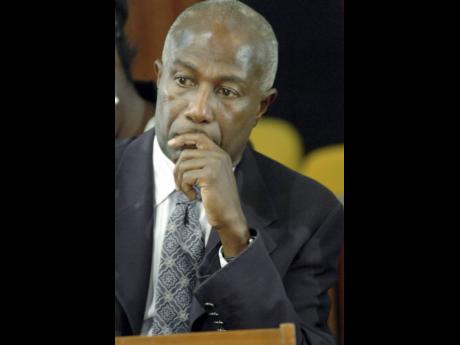BRADY BILL CLIMBS
FCJ forks out over $14m in continuing attempt to recoup $100m from ex-lawyer
The Factories Corporation of Jamaica (FCJ) has so far racked up more than $14 million in legal and associated costs in its fight to recover a $100-million judgment debt plus interest from disbarred attorney-at-law Harold Brady, who handled a land...
The Factories Corporation of Jamaica (FCJ) has so far racked up more than $14 million in legal and associated costs in its fight to recover a $100-million judgment debt plus interest from disbarred attorney-at-law Harold Brady, who handled a land transaction for the agency but pocketed the money.
“To date, it has paid between Myers, Fletcher & Gordon and Guardsman for legal fees and process serving fees, private investigators report to try and find Mr Brady … $14,336,431.54,” the agency’s lawyer, Amanda Montague, disclosed on Friday in the Supreme Court.
The agency is seeking to have a committal hearing to have Brady committed to prison for his refusal to honour the debt.
Montague also pointed out that the judgment debt, as of October 2, stands at approximately $134.5 million.
The debt stems from the botched $140-million sale of an FCJ-owned property on Marcus Garvey Drive in Kingston to late former JLP Cabinet minister Neville Gallimore, between 2007 and 2014. Brady, who did legal work for the FCJ during the period, handled the sale.
According to the FCJ, Brady collected the full purchase price for the property, but only accounted for $70 million despite “numerous requests” to hand over the remaining funds.
Further, the FCJ complained that Brady’s failure to hand over the file relating to the transaction “with due expedition” and to register the sale agreement within 30 days caused the company to incur interest and penalties that pushed the debt to $111 million.
After a hearing, the General Legal Council in February 2017 found Brady guilty of professional misconduct. Weeks later, it ordered that his name be struck from the list of attorneys authorised to practise in Jamaica and that he should pay the FCJ $111 million with interest.
Brady was also given the option of paying $1 million per month, starting January 4, 2019, but to date, he has not paid a cent. The orders also included a notice for Brady to be sent to prison if he did not comply.
Consequently, the FCJ had initiated a committal application to have Brady committed to prison for breaching the December 2018 order, but while the application was being heard, Brady recently filed a proposal under the Insolvency Act, which automatically paused the application.
A person who is unable to satisfy their debt can file a proposal under the act, indicating how he or she intends to repay the debt. The person is essentially given time to reorganise his or her affairs.
However, Montague, in her application, has argued that the proposal submitted by Brady is not valid as he has not proposed a scheme of arrangement or extension of time or composition to satisfy the creditors.
According to her, the proposal and the invoking of the Insolvency Act is simply a means of frustrating the committal proceedings and is not a genuine attempt by him to gain relief.
She also noted that although Brady has acknowledged the judgment debt in his proposal, he is still relying on the set-off defence, in which he is maintaining that the FCJ owed him money for work that was done and that, essentially, he would still be owed about $5 million.
However, Montague said the Court of Appeal had already considered and rejected that defence, saying that it was incapable of belief.
Among the FCJ’s arguments for lifting the stay is also that the agency would be materially prejudiced by the continuing of the automatic stay. Other factors such as the growing legal and associated expenses, the outstanding judgment debt, as well as the delay in the committal hearing, which started in 2017, were also highlighted as material prejudice.
Montague further submitted that regardless of the outcome of the insolvency application, Brady would not be discharged from the judgment debt as the claim involves an offence that concerns dishonesty.
Although the insolvency application may buy Brady additional time, the outcome is inevitable, she said.
“Mr Brady, at some point, will have to answer to the debt,” the attorney said, while adding that Brady does not stand to suffer any prejudice from the lifting of the stay.
Montague also argued that it was inequitable to have the stay in place and relied on a local case in which Chief Justice Bryan Sykes had lifted the automatic stay after he concluded that the debtor was not acting in good faith and was not acting in a manner that was consistent with the act.
In his response, Brady’s attorney, Douglas Leys, KC, submitted that the provision of the act provides the automatic stay and that the court can only lift the stay in exceptional circumstances.
Leys will continue his argument before Justice Carolyn Tie-Powell when the hearing continues on January 16, 2024.

